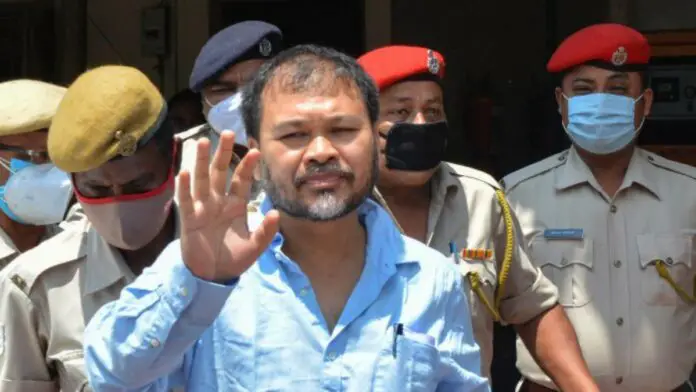
The special NIA court in Guwahati, under Hon’ble Justice Pranjal Das, ordered the release of Raijor Dal chief Akhil Gogoi who was arrested with numerous charges in the Chandmari case some of which include sedition, incitement to violence, and blockade.
The Hon’ble court interpreted that holding mere protests without incitement to any offence or violence cannot be termed as an offence under section 15 of the Unlawful Activities (Prevention) Act, 1967 (hereinafter referred to as “UAPA, 1967”). This is only a natural feature of any democracy. The accused had also been charged with allegations like vandalizing and damage to property which he has been exempted from by the Hon’ble court.
Dhirjya Konwar, Manas Konwar, and Bittu Sonowal, the co-accused have also been released of all charges. Gogoi had been accused of causing incitement and dissatisfaction against the government established under due process of law, causing enmity among various groups and enticing communalism under the pretext of protesting against the Citizenship Amendment Act, 2019. The Hon’ble Court has held that such actions cannot be termed as acts of terrorism as there has been the use of no destructive weapons. The evidence of any sort of hate speech has also not been produced before the Hon’ble court.
The Hon’ble court also noted that the witnesses who testified before the Hon’ble court had failed to secure the confidence of the Hon’ble judges. Only based on oral witnesses, supported by no factual accuracy or substantial evidence, such grave charges cannot be framed against an accused. There had been allegations that the accused and the ones supporting him had tried to implement a blockade and closure which could have harmed the economic situation of the country. In this way, they had allegedly tried to affect the unity and integrity of India negatively. The Hon’ble judge has observed that very often cases of peaceful protests are presented in a different light to safeguard the government. To term, the voicing of opinions as disobedience to the state or terrorism would itself pose a threat to the democracy of the nation where citizens have a fundamental right to express dissent.
Therefore, the Hon’ble court ruled that the state needs to interpret and understand the sections in the Indian Penal Code, 1860 as well as the UAPA, 1967 before labeling such serious charges like terrorism or sedition against any accused. Thus, the accused had been released of all allegations by the Hon’ble court.








